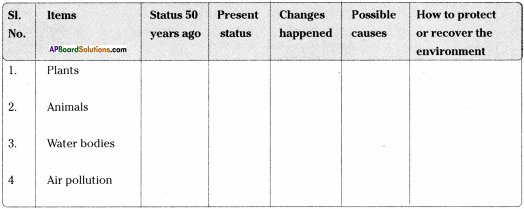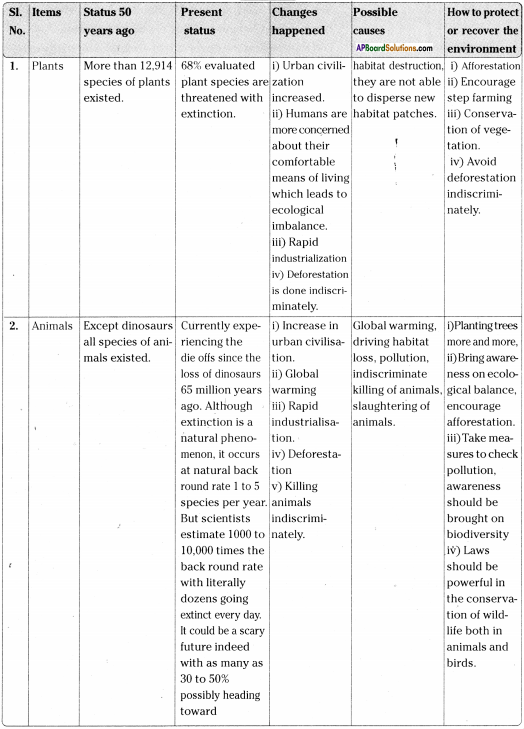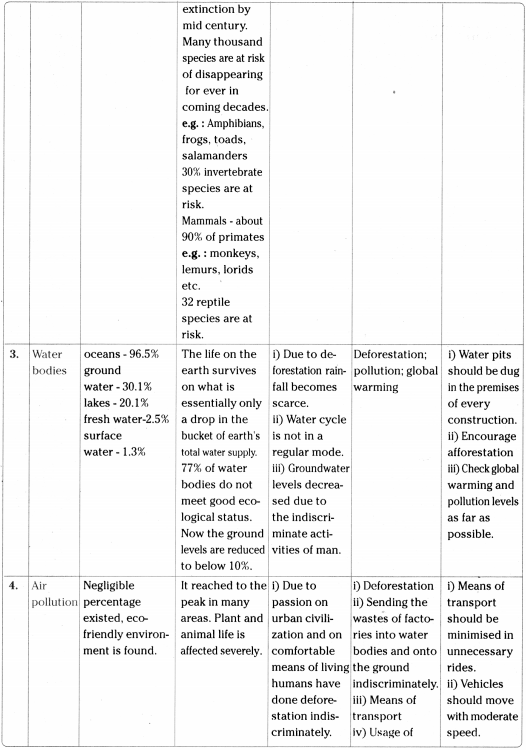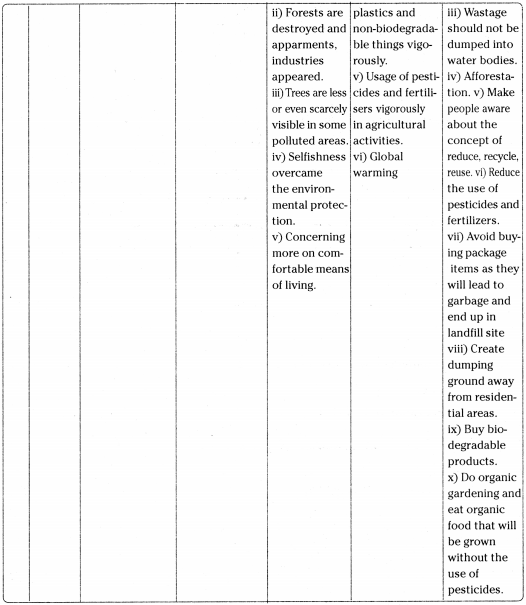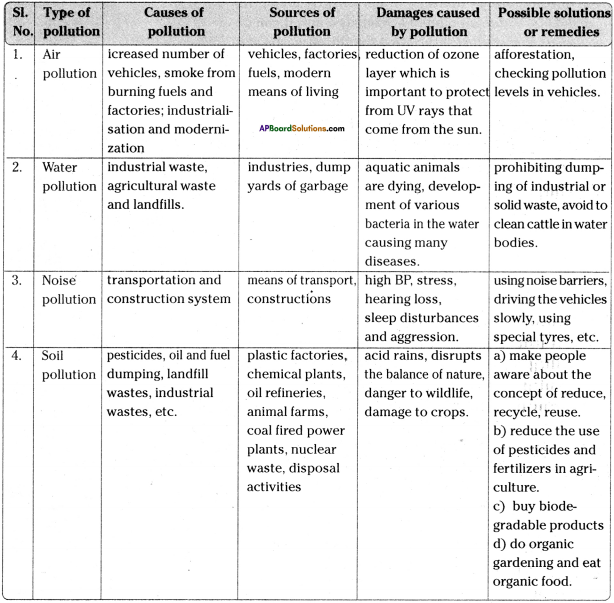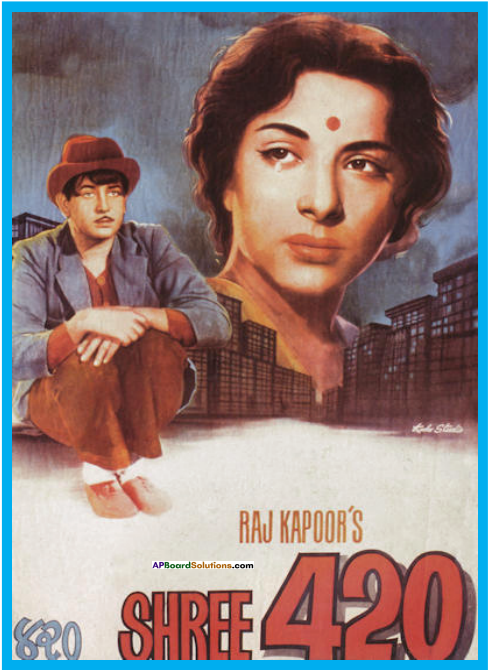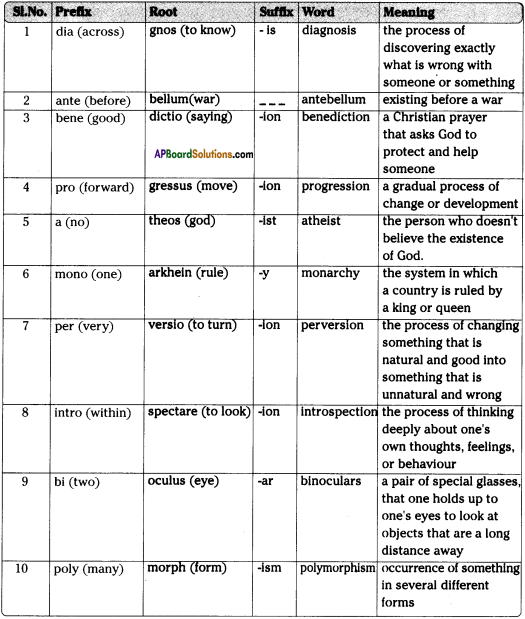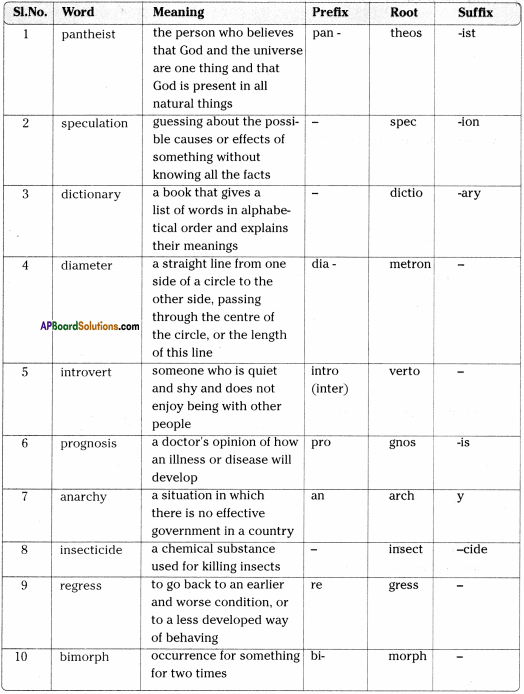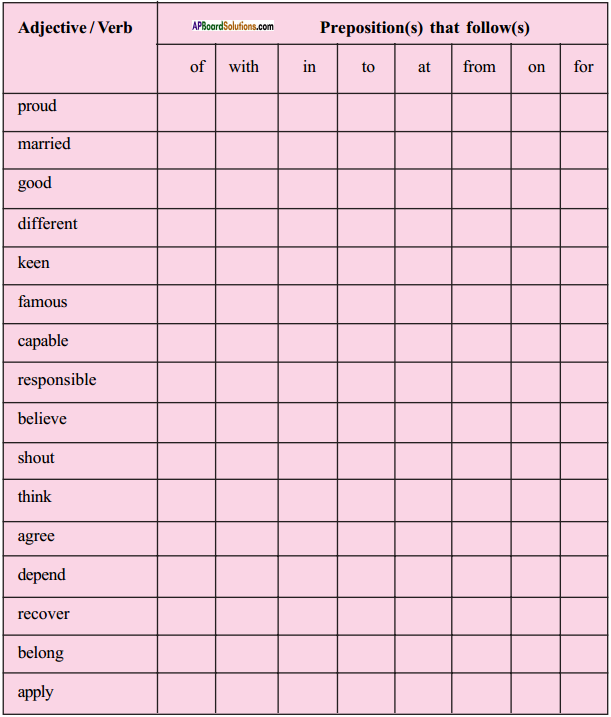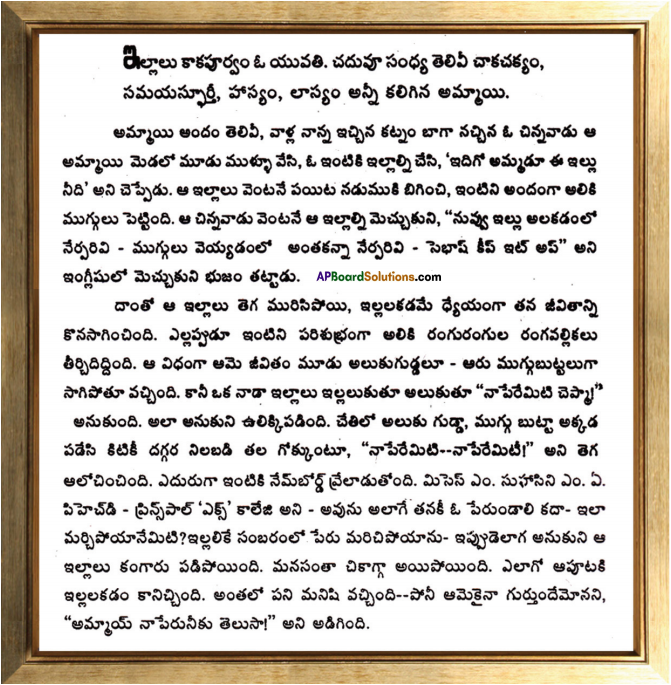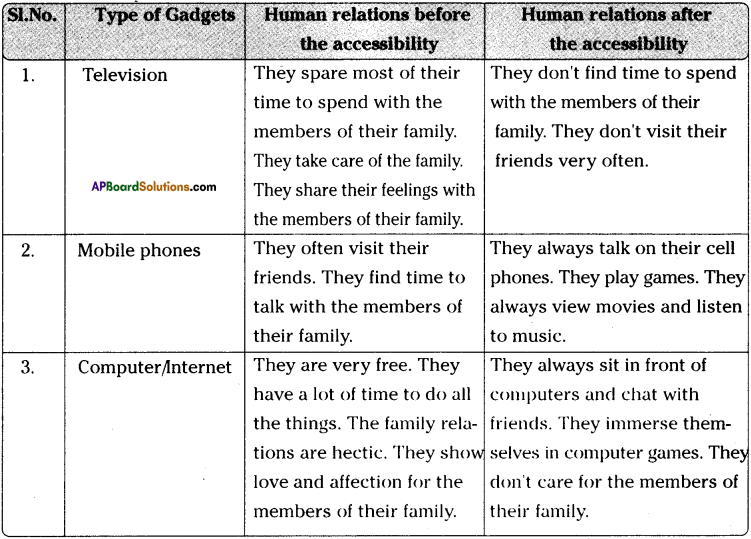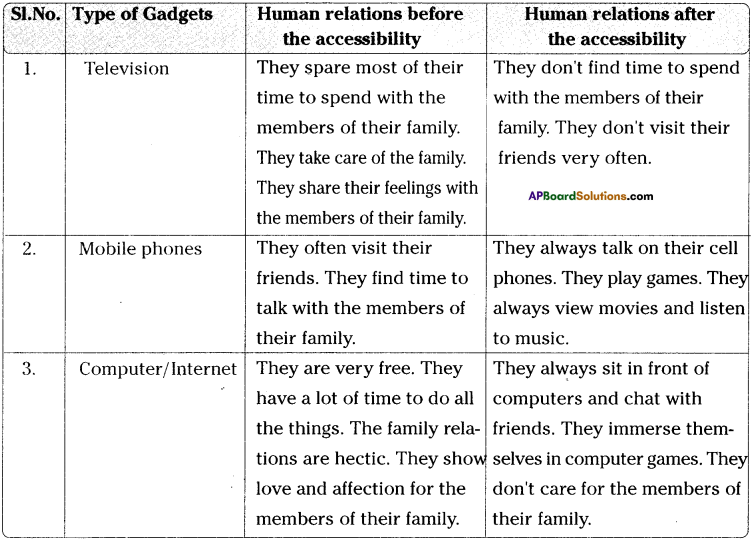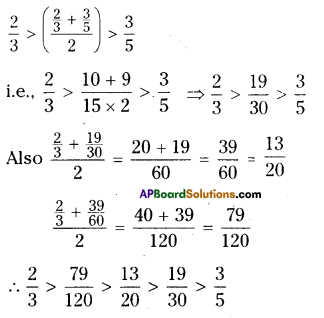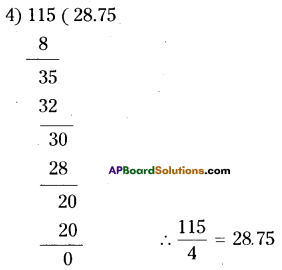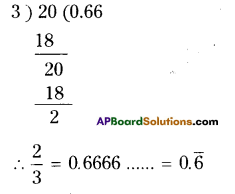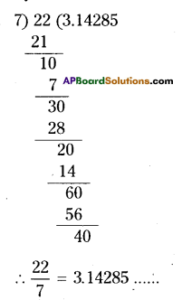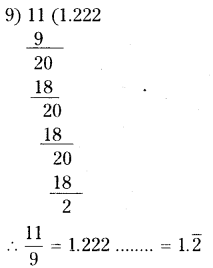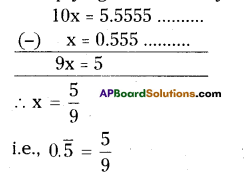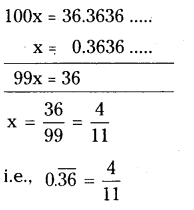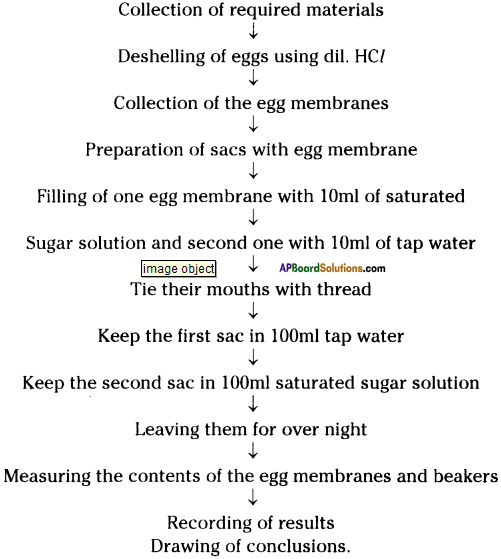AP State Board Syllabus AP SSC 10th Class English Textbook Solutions Chapter 6A My Childhood Textbook Questions and Answers.
AP State Syllabus SSC 10th Class English Solutions Chapter 6A My Childhood
10th Class English Chapter 6A My Childhood Textbook Questions and Answers
Look at the picture and answer the questions that follow.
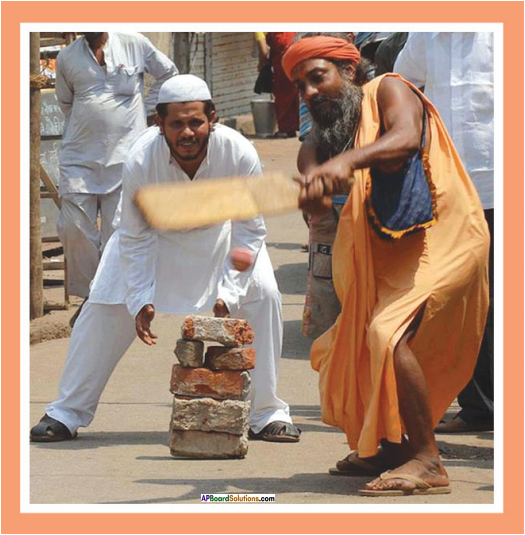
Question 1.
What does the picture signify?
Answer:
The picture shows two persons of different religions showing zeal to play together. The unified thought for a common purpose represents the country’s integrity and unity.
For ages people in India have been living with the feelings of fraternity and integrity. Historically India has been a land with people of many religions like Hinduism, Buddhism, Jainism, Islam, Christianity, etc. Still all Indians show brotherhood. India is a land of different races, tribes, castes, languages, customs and traditions. But there is oneness in all these things. Our country is a land of great physical and socio-cultural contrasts marked by unity in diversity.

Question 2.
Do you experience the theme reflected in the picture in your real life? If not, what may be the possible reason for this?
Answer:
Yes. I experience the theme of unity in my real life but sometimes the unity disappears in certain situations. The reason for this can be orthodox feelings of certain people, superstitious and narrow-minded attitude of the people with rigid thoughts. While some people strive continuously to keep up the nation’s strength with verisimilitude, there are others who try to split the nation’s strength with blind beliefs and sunder the foundation.
Comprehension
Answer the following questions.
Question 1.
What were the disadvantages faced by Kalam in his childhood?
Answer:
Kalam was born in a middle-class Tamil family in the island town of Rameswaram. His parents were poor and had no much formal education.

Question 2.
“ ……… that forced Samsuddin to look for a helping hand.” What does ‘that’ refer to?
Answer:
When the train halt at Rameswaram station was suspended during the emergency, Samsuddin, the cousin of Kalam needed a helping hand to catch the bundles of newspapers. Then Kalam came forward to do that job. Here, that’ refers to the necessity of a person to help Samsuddin catch the bundles of newspapers.
Question 3.
“I filled the slot.” What does the sentence mean?
Answer:
When Samsuddin, the cousin of Abdul Kalam needed a person to catch the bundles of newspapers thrown from the running train between Rameshwaram and Dhanuskodi, Kalam could do that job successfully. He took up the job willingly and cleared the problem.
Question 4.
If one wants to bring a change in the social system, what qualities should one possess?
Answer:
If one wants to bring a change in the social system, one should have patience, equanimity, perseverance, bravery and determination.

Question 5.
Events from the Ramayana and from the life of the Prophet were the bedtime stories my mother and grandmother would tell the children in our family.
Choose the most appropriate meaning for the underlined phrase from the options given below.
a) stories told by the bed side
b) stories told on the bed
c) stories told before going to sleep
Answer:
(c) stories told before going to sleep
Question 6.
“ Your children are not your children ….” What does it mean? Do you agree or disagree with the statement? Give reasons.
Answer:
These words were spoken by Kalam’s father, Jainulabdeen in the context of his wife’s hesitation to send Kalam to Ramanathapuram. He told his wife the expression “Your children are not your children” means as children are growing they have their own ideas. I agree with the idea of Kalam’s father because children have every right to form their own thoughts and ideas. The environment in society helps children to develop an individual attitude. Parents should take it easy.
Question 7.
As children, none of us ever felt any difference amongst ourselves because of our religious differences and upbringing.
Choose the most appropriate meaning for the underlined word from the options given below.
a) education
b) cared and trained
c) food and shelter
Answer:
(b) cared and trained
Question 8.
Read the text and attribute the characteristics given in the box to the following women.

a) Subramania Iyer’s wife
b) Ashiamma
Answer:
a) Subramania Iyer’s wife – conservative, adamant, and orthodox
(i) conservative – She could not invite Kalam to her house.
(ii) adamant – She refused to serve meal to Kalam.
(iii) orthodox – She remained in the kitchen when Kalam was served meal by Subramania Iyer.
b) Ashiamma – sociable, kind, secular, generous, simple, tolerant
(i) sociable – She was friendly with all the people who visited her house.
(ii) kind – She was kind with all the guests and family members.
(iii) secular – Irrespective of the religious differences, Ashiamma fed all the people who came to her house.
(iv) generous – She gave a secured emotional and material comforts to her children.
(v) simple – Ashiamma was a good partner to her husband and led a simple and happy life with him.
(vi) tolerant – She was tolerant towards the visitors and her children.

Question 9.
Identify the features of the text “ My Childhood”.
a) What type of text is it?
b) Reflections on the text
c) Anecdotes in the text
Answer:
a) The text is an autobiographical narrative.
b) The whole text focuses on the secular, national, and emotional feelings that were experienced by Kalam in his childhood. The feeling of Unity in Diversity was best inculcated in the minds of young Kalam and his friends. The image of brotherhood irrespective of caste, creed or religion is highlighted to indulge the joy of unity.
c) i) The situation in which Kalam earned money by selling tamarind seeds and catching paper bundles from the running train
ii) Kalam’s friendship with Brahmin boys
iii) The ill-treatment of the new teacher towards Kalam and the warning given by Lakshmana Sastry to the new teacher not to show any discrimination that would spoil the minds of innocent children
iv) The hospitality of Sivasubramania Iyer
Vocabulary
I. Fill in the blanks with suitable words often confused given in brackets.
1. Samsuddin helped me earn my first _________ (wages/income).
2. He received a proportion of his ________ (wages/income) from selling tamarind seeds.
3. He is ________ (innocent/ignorant) about technology.
4. However he was found _________ (innocent/ignorant) of any crime.
5. He lost all the wealth he had _________ (inherited/acquired) from his father because he _________ (acquired/inherited) bad habits.
6. People from different backgrounds could ________ (mix/mingle) easily. _________ (Mixed/Mingled) group of people do not come to an agreement.
7. People in Rameshwaram were very __________ (rigid/adamant) in terms of segregation of different social groups. Subramania Iyer _________ (rigidly/adamantly) opposed it.
8. The car collided with a _________ (stationary/stationery) vehicle when we were going to buy some __________ (stationary/stationery) from the book stall.
9. She was ________ (envelop/envelope) in a huge white towel.
10. We sent an airmail _________ (envelop/envelope) abroad.
11. The floor was _______ (laid/lied) with a newspaper.
12. He _______ (laid/lied) many times.
Answer:
- income
- wages
- ignorant
- innocent
- inherited, acquired
- mingle, mixed
- rigid, adamantly
- stationary, stationery
- enveloped
- envelope
- laid
- lied
Meanings of the words often confused :
1. a) income : money received for work
b) wages : a fixed regular payment
2. a) innocent : not guilty of any crime
b)ignorant : lacking knowledge
3. a) acquire : buy or get
b) inherit : receive property from someone (esp. parents) when they die
4. a) mingle : mix together
b) mix : go together socially
5. a) adamant : refuse to change mind
b) rigid : inflexible
6. a) stationary : stable; not moving
b) stationery : books, pens, pads, etc.
7. a) envelop : wrap or surround completely
b) envelope : flat paper container for a letter
8. a) laid : placed
b) lied : said untrue statements
II. Tick (✓) the appropriate meaning of the underlined word in each sentence below.
1. Kalam’s father possessed great innate wisdom and a true generosity of spirit,
a) hospitality
b) nobility
c) kindness
Answer:
b) nobility
2. A sudden demand for tamarind seeds erupted in the market.
a) started
b) came up
c) appeared suddenly
Answer:
c) appeared suddenly

3. Our family arranged boats for carrying idols of the Lord from the temple to the marriage site, situated in the middle of the pond.
a) place
b) ceremony
c) feast
Answer:
a) place
4. The new teacher could not stomach a Hindu priest’s son sitting with a Muslim boy.
a) imagine
b) permit
c) tolerate
Answer:
c) tolerate
5. He looked utterly downcast as I shifted to my seat in the last row.
a) lonely
b) sad
c) disappointed
Answer:
b) sad
6. Sastry hluntlv asked the teacher to either apologise or quit the school,
a) immediately
b) angrily
c) plainly
Answer:
b) angrily
7. The small society of Rameswaram was very rigid in terms of the segregation of different social groups.
a) strict
b) firm
c) strong
Answer:
a) strict
8. Sivasubramania Iyer was not perturbed, nor did he get angry with his wife,
a) disturbed
b) disappointed
c) pleased
Answer:
b) disappointed

9. India’s freedom was imminent.
a) expected
b) necessary
c) certain
Answer:
c) certain
Grammar
I. Read the following paragraph and note the underlined words.
… On the whole, the small society of Rameswaram was very rigid in terms of the segregation of different social groups. However, my science teacher Sivasubramania Iyer, though an orthodox Brahmin with a very conservative wife, was something of a rebel. He did his best to break social barriers so that people from varying backgrounds could mingle easily.
Notice the underlined words or phrases in the above paragraph. They are called linkers or discourse markers. Noticing and understanding discourse markers help learners to understand the logical structure of what they read and listen to, the order of events and the attitude of the speaker or writer and what they refer to.
Think of the following.
1. What makes the writer use the linker ‘ on the whole’ in the above paragraph? Give reasons.
Answer:
The writer used the linker on the whole’ in order to summarise the previous incidents. When Kalam was separated from his close friend and orderd to sit in the last row by the new teacher, Lakshmana Sastry, the priest of the temple told the teacher that he should not spread the poison of social inequality and religious intolerance in the minds of innocent children. He bluntly asked the teacher to either apologize or quit the school and the island.
2. What purpose does the linker ‘however’ serve in the paragraph?
Answer:
‘However’ serves as a linker indicating the result of an action. The science teacher was a broadminded Brahmin while his wife was conventional and adamant of the beliefs.
3. What does the writer emphasize by using the linker ‘ though’?
Answer:
The linker though’ indicates contrast signal of two diversified thoughts. In this context Sivasubramania Iyer did his best to break all the social inequalities and his wife was conservative and orthodox. The linker though’ was used to indicate the inheritance of family culture in Iyer on par with his ideas of breaking social barriers in spite of different backgrounds.

4. Why did the writer use the linkers?
Answer:
The writer used the linkers in order to bring the unity in the text. The linkers help to keep the ideas together, synchronize them and assiduously arrange them to make the text effective. They are the pivotal words to maintain the logical structure and sequence of the passage.
Explanatory Notes on ‘Linkers’:
Linkers are words or phrases that we use to link (i.e. connect or join) ideas.
It was raining. I stayed at home.
In this example, we can see that the first idea, ‘It was raining’ is the reason for the second idea, ‘I stayed at home’. Or I stayed at home’ is a result of ‘It was raining.’
We can use linkers such as so or therefore to make the relationship between the two ideas clear.
It was raining so I stayed at home.
It was raining. Therefore, I stayed at home.
We could also change the order and put the result before the reason and use a linker such as because.
I stayed at home because it was raining.
The linkers so, because and therefore show a relationship of reason and result or cause and effect.
Let’s look at another example.
It was raining. I went for a walk.
This time there is a different relationship between the two ideas. People don’t usually go for a walk if it is raining. The second idea doesn’t normally follow from the first one. It is unexpected. This relationship where the ideas are different or opposing is called contrast.
We can use linkers such as but, although, and however to show contrast and make the relationship between the ideas clear.
It was raining but I went for a walk.
Although it was raining, I went for a walk.
It was raining. However, I went for a walk.
Sometimes we want to compare two things that are different.
I always go to bed early.
My sister goes to bed very late.
This is also a kind of contrast and we can make the relationship clear using linkers such as while, whereas, but, however or on the other hand.
I always go to bed early, whereas my sister goes to bed very late.
I always go to bed early. My sister, on the other hand, goes to bed very late.
One other common relationship between ideas is addition, when we want to add ideas. I like seafood.
I like spicy food.
We could add these ideas with linkers such as and, also and too.
I like seafood and spicy food.
I like seafood. I also like spicy food.
I like seafood. I like spicy food too.
In written English, we sometimes want to add ideas such as points in an argument. This is common when writing essays and reports.
The cost of relocation would be very high.
There are no suitable premises currently available.
A move would be unpopular with staff.
In formal writing we can join ideas like these with linkers such as furthermore, more-over, in addition and besides.
The cost of relocation would be very high. Furthermore, there are no suitable premises currently available and a move would be unpopular with staff.
You will notice that we can link two ideas in one sentence or two. Your choice will usually depend on how complicated each idea is and whether you are speaking or writing. Simple ideas in spoken English are often joined with simple linkers like and, but, because and so-
I felt tired so I went to bed early.
More complex ideas in written English are often joined in two sentences.
The disadvantages of relocating to a new site on the coast are considerable. Therefore, we recommend retaining the existing premises in London for the time being.
When we link ideas in one sentence, each idea usually has a clause and the linker is usually a conjunction.
The linkers and, but, so, while, whereas and although are conjunctions and join ideas as clauses in one sentence.
The linkers however, on the other hand, therefore, furthermore, etc. are adverbs and link ideas in two sentences.
Some linkers are prepositions. They can link the same kinds of ideas but the grammar is different. They don’t link clauses or sentences. They show a link between a word or phrase, usually a noun or noun phrase and the whole sentence.
We can use the preposition despite and the phrase in spite of (which works in the same way) to show contrast.
I went for a walk despite the rain.
In spite of her heavy cold, she managed to give a brilliant presentation.
We can use due to and because of in the same way.
Due to the terrible weather we have cancelled the picnic.
Besides can be used as a preposition to add ideas (it can also be used as an adverb). Besides the problem with transport, we also had to deal with a financial situation.
A. Here is a list of linkers. Some of them can be used synonymously. Refer to a dictionary and group them in the following table according to the function they perform in a sentence or discourse.


Answer:
| Function |
Linkers |
| 1. Indicating addition |
besides, furthermore, moreover |
| 2. Contrasts |
on the other hand, on the contrary, yet, still, nevertheless, all the same, however |
| 3. Result |
as a result, thus, therefore, hence, so, consequently |
| 4. Indicating sequence in time |
later, suddenly, at the same time, meanwhile, subsequently |
| 5. Indicating a parallel (similarity) |
equally, in the same way, likewise, similarly |
| 6. Ordering points |
firstly, to sum up, thirdly, secondly |
B. Fill in the blanks with appropriate choices from brackets.
1. I don’t want to go to a restaurant; _______ (besides / as a result), we can’t afford it.
2. A career in IT field is lucrative; _______ (similarly / at the same time), it is stressful and it can even be harmful to one’s health.
3. I understand your problems; _______ (although / however), I can’t help you.
4. Transportation has developed a lot in India; _______ (likewise / whereas), the trade too has improved.
5. Some of the students scored low ranks in the exams; _______ (so that/consequently), the teacher arranged a series of remedial classes.
Answer:
- besides
- at the same time
- however
- likewise
- consequently
C. Complete the following paragraph by choosing the appropriate linking words.

Linking words help us in many ways in writing. ___(1)___, they help us in presenting our ideas in a meaningful way. ___(2)___, they help us to introduce and develop the main idea of the paragraph ___(3)___, they help us to illustrate and add supporting details ___(4)___, they help us in moving from one idea to another by binding one sentence with another. ___(5)___, they help us to understand the ideas presented in the paragraph ___(6)___, using too many linking words ruins the structure and coherence of the paragraph.
Answer:
1. For example
2. Secondly
3. Thirdly
4. Next
5. Finally
6. However
D. Join the following sentences using the linkers given in brackets.
1. There were freezing temperatures. They trekked for hours, (in spite of)
2. It’s an interesting city. We’re going to visit it again, (such … that)
3. We booked a holiday. We had very little money, (although)
4. The tour guide was informative. We didn’t need to read our guidebook, (so … that)
5. He didn’t like water. He booked a cruise. (In spite of the fact that)
6. Preachers preach many good things. Many of them do not practise what they preach. (however)
7. Jainulabdeen had no formal education and no wealth, (neither….nor)
8. The continental dimensions of the country account for the variations and diversities. There are several religious sects and beliefs, (besides)
Answer:
1. In spite of freezing temperatures, they trekked for hours.
2. It’s such an interesting city that we’re going to visit it again.
3. We booked a holiday although we had very little money.
4. The tour guide was so informative that we didn’t need to read our guidebook.
5. In spite of the fact that he didn’t like water, he booked a cruise.
6. Preachers preach many good things, however, many of them do not practise what they preach.
7. Jainulabdeen had neither formal education nor wealth.
8. The continental dimensions of the country account for the variations and diversities, besides there being several religious sects and beliefs.
II. Passive voice without agent.
Observe the following sentences taken from the text.
I was born.
Emergency was declared.
I was asked to go and sit on the back bench.
You might have learnt in your previous classes about active and passive voice constructions. Though the above sentences are in the passive the agent is not mentioned.
The agents are not mentioned in the following situations.
- When the agent is obvious
- When the agent is not known
- When it is not desirable to reveal the identity of the agent
Examples:
1. A thief was arrested.
2. My watch has been stolen.
3. A surprising gift was presented on my birthday.
4. These new buildings have been occupied.
5. The judgement was given.
Explanatory Notes on ‘Passive Voice without Agent’:
Read the following passage :
Before the telephone was invented, communication was very difficult. The new technology has changed human life very much. With the invention of mobile phones, the number of phone calls has multiplied. Every minute, millions of phone calls are made all over the world. Some offices in developed countries already have videophones which allow caller to see each other as they speak. In the coming years, videophones will be installed in every home and office.
The verb groups was invented, are made, and will be installed are said to be in passive voice because these verbs do not have the doer’ as their subject. The affected, which is supposed to be found as the object, is in the subject position.
For example, in the first sentence, the telephone is the affected and there is no doer expressed in the sentence.
In the active voice, the subject is usually the doer’ and in the passive voice the subject is not the doer’.
The passive voice is mainly expressed by using the be form of the verb along with a past participle of the main verb.
The following table provides passive forms of the verb ‘visit’.
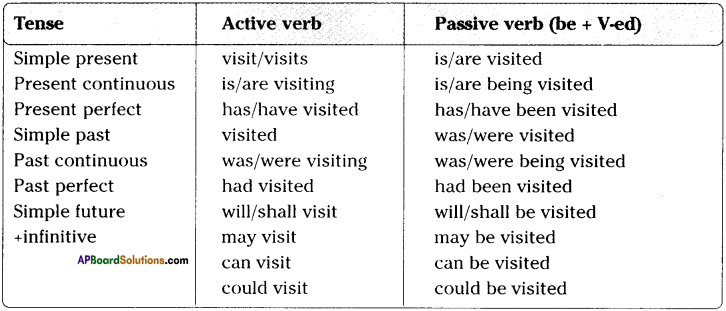
Usually, only a transitive verb (the verb with an object after it) has active and passive forms. Intransitive verbs do not have passive forms. So we cannot change a sentence with an intransitive verb into passive voice. When a sentence is changed from active voice to passive voice, the object of the transitive verb moves to the subject position.
1. Active : She is singing a song.
Passive : A song is being sung by her.
2. Active : Rama killed Ravana.
Passive : Ravana was killed by Rama.
3. Active : He will help me.
Passive : I shall be helped by him.
The subject (agent) of the active verb is made a by-object in the passive sentence.
1. Active : The Chief Minister inaugurated the exhibition.
Passive : The exhibition was inaugurated by the Chief Minister.
2. Active : Alexander Flemming discovered Penicillin.
Passive : Penicillin was discovered by Alexander Fleming.
Ditransitive verbs have two objects (direct and indirect objects) after them. In that case, both objects can be moved to the subject position. So we can form two passive sentences from a sentence with a ditransitive verb ; in one sentence the direct object becomes the subject and in the other, the indirect object becomes the subject.
Active : They gave us nice presents. Ind.obj. Direct obj.
Passive : Nice presents were given to us by them. We were given nice presents by them.
Active : He has taught us grammar. Ind.obj. Direct obj.
Passive : Grammar has been taught to us by him. We have been taught grammar by him.
Now, let’s learn about the passive voice without agent.
Sometimes, a passive voice does not contain an agent. This is because we do not know who or what did the action.
e.g.: Henry’s office was burgled yesterday.
When the agent of an action is unimportant e.g.:
Active : People warned us about the dangerous areas in that city.
Passive : We were warned about the dangerous areas in that city.
We usually leave out the agent in a passive voice if the person or thing that did the action is obvious.
e.g. :
Active : Ellen writes her essays with humour and wit.
Passive : Ellen’s essays are written with humour and wit.
Some more examples :
1. Passive : The watch was stolen.
Here the doer is not known. Hence we take someone as the doer.
Active : Someone stole the watch.
2. Passive : The thief was arrested.
Here we know that Policeman made the arrest. Hence we take POLICEMAN as the doer.
Active : Policeman arrested the thief.
3. Passive : The Chief Minister is expected to come tomorrow.
Here we know that people expect him.
Active : People expect the Chief Minister to come tomorrow.
4. Passive : His purse has been stolen.
Active : Someone has stolen his purse.
5. Passive : Letters are delivered twice a day.
Active : The postman delivers letters twice a day.
6. Passive : The rules should be obeyed.
Active : We should obey the rules.
Pick out from the text some more passive constructions without agents and give reasons why the agent is not mentioned.
1. __________________
2. __________________
3. __________________
4. __________________
5. __________________
Answer:
1. All necessities were provided for, in terms of food, medicine or clothes. Here the agent is obvious that the basic necessities are provided by parents.
2. 1 was asked to go and sit on the back bench. Here the agent is vague but the consequence is more important.
3. Every child is born. Here the agent is obvious.
4. India was forced to join the Allied Forces. Here the agent is not known.
5. A state of emergency was declared. Here the agent is obvious.
6. The house was built in the middle of the nineteenth century. Here the agent is not known.
III. Edit the following paragraph. It has some errors in the areas like punctuation, spelling, tense, prepositions, articles.
he told me as if thinking aloud abul i know you have to go away to grow did the seagull not fly toward the son alone without a nest he quotes Khalil Gibran to my hesitant mother your children are not your children they are sons and daughters of lifes longing to itself they come to you but not from you you may give them love but not your thoughts for they have there own thoughts
Answer:
He told me as if thinking aloud, “Abul! I know you have to go away to grow. Does the seagull not fly across the sun, alone and without a nest ?” He quoted Khalil Gibran to my hesitant mother, “Your children are not your children. They are the sons and daughters of Life’s longing for itself. They come through you but not from you. You may give them vour love but not your thoughts, for they have their own thoughts.”
Writing
I. Diary entry
Imagine that you were one of the students who witnessed the humiliation done to Kalam in the classroom. Reflect on the incident and write your emotions in your diary.
Friday, 9th Nov. 20xx
Time : 8.00 p.m.
Dear Diary,Today was a day of misfortune for Kalam. I was deeply moved when the new teacher ordered him to sit in the last bench. He was so mean to say so. I looked anxiously at Kalam and Sastry. And Kalam was so obedient that he went and sat in the last bench. After all, he obtained the qualities of self-discipline and obedience from his father. I really got angry with the new teacher for his decision in humiliating Kalam. I was surprised to see Ramanadha Sastry feeling even more worse for the teacher’s decision. However, it is not fair to show social inequality in the village. We know pretty well that the communal and religious differences for every individual in his/her childhood has to be erased to develop equality and fraternity among them. Everyone of us are proud of having deep friendship among us. I always admire the close and amiable nature of Kalam and Sastry. I hope they remain as friends for ever.Rajesh |
II. In the lesson, Kalam gave a brief description of his heritage.
Kalam says,” I don’t recall the exact number of people she (his mother) fed every day, but I am quite certain that far more outsiders ate with us than all the members of our family put together.”
This shows the heritage of hospitality and kindness.
Kalam says, “Events from the Ramayana and from the life of the Prophet were the bedtime stories my mother and grandmother would tell the children in our family.” This shows the heritage of secular spirit.
Read the entire text and identify the aspects related to the heritage of Kalam and his village.
Answer:
1. I had three close friends in my childhood – Ramanadha Sastry, Aravindan and Siva- prakasan.
– This shows the heritage of universal brotherhood.
2. As children, none of us ever felt any difference amongst ourselves because of our religious differences and upbringing.
– This shows the heritage of unity in diversity.
3. During the annual Shri Sita Rama Kalyanam ceremony, our family used to arrange boats with a special platform for carrying idols of the Lord from the temple to the marriage site.
– This shows the heritage of communal equality.
4. Ramanadha Sastry looked utterly downcast as 1 shifted to my seat in the last row according to the instructions of new teacher.
– This shows the heritage of communal brotherhood.
5. Not only did the teacher regret his behaviour but the strong sense of convicton Lakshmana Sastry conveyed ultimately reformed this young teacher.
– This indicates the heritage of social equality and communal tolerance.
6. Sivasubramania Iyer did his best to break social barriers so that people from varying backgrounds could mingle easily.
– This shows the heritage of social and economic equality and unity in diversity.
III. Here is a letter that Moses wrote to his friend Ravi from the United States of America. Imagine yourself as Ravi and give a reply.
|
St. John’s Enclave,
5-7/9,
St. Pauls Avenue,
Washington D.C.
June 27, 2013.
Dear Ravi,
I am really excited to write to you after a long time. Hope this letter finds you in a cheerful mood.
Here is some good news for you. That means, I would like to visit India sometime between October and November and stay there at least for a month and would like to visit your place.
Since I am coming to India for the first time, I would like to know about the people, their way of dressing, the food they take, the festivals they celebrate, the music and dance they like, etc. In fact, I have read about Indian culture through books and internet. But I would like to have some authentic information from you.
Hope I can hear from you soon.
Convey my greetings to your family.
Your lovingly,
Moses Bridge
To
Ravi.K,
S/o Bose,
10-92, Church Road,
Nidamanuru,
Krishna District,
A.R, India – 521 104. |
Answer:
Reply Letter:
|
Road No. 12,
10-92, Ashok Enclaves,
Flat No. 201, Church Road,
Nidamanuru,
Krishna District,
A.R, India – 521 104.
July 1, 2013.
Dear Moses,
Very happy to receive a letter from you after a long time. I am longing to see you in person. To visit India in October and November is the right time because the weather would be pleasant and quite comfortable to go around.
I am proud to tell you that India is a country with many historical places and varied cultural heritage. This secular state is well-known to follow ‘Unity in Diversity’. In and around Hyderabad there are many places that represent Indian culture and tradition. Places like the Charminar, the Golkonda fort and Sultan bazar exhibit their historical significance and culture. The N.T.R. Marg. Buddha Statue depict the nationalism and heritage of love and peace.
I hope you will enjoy the trip to India. Places like Delhi, Kolkata, Mumbai in the north are sophisticated and places like Kerala, Rameshwaram, Kanyakumari and Karnataka in the south are pleasant and known for scenic beauty.
I eagerly wait for your arrival and 1 promise to make your trip a memorable one.
Bye. See you soon !
Yours lovingly,
Ravi
To
Moses Bridge
St. John’s Enclave.
5-7/9, St. Paul’s Avenue,
Washington D.C.
USA.
|
Listening
Listen to an extract from the speech by A.P.J. Abdul Kalam at IIIT Hyderabad on 27th September 2011.
A Speech by A.P.J. Abdul Kalam
Dear friends,
“I have three visions for India. In 3000 years of our history, people from all over the world have come and invaded us, captured our lands, conquered our minds. From Alexander onwards, the Greeks, the Turks, the Moghuls, the Portuguese, the British, the French, the Dutch, all of them came and looted us, took over what was ours. Yet we have not done this to any other nation. We have not conquered anyone. We have not grabbed their land, their culture, their history and tried to enforce our way of life on them. Why? Because we respect the freedom of others.
That is why my first vision is that of freedom. I believe that India got its first vision of this in 1857, when we started the war of independence. It is this freedom that we must protect and nurture and build on. If we are not free, no one will respect us. My second vision for India is development. For fifty years we have been a developing nation. It is time we saw ourselves as a developed nation. We are among top 5 nations of the world in terms of GDP. We have 10 percent growth rate in most areas. Our poverty levels are falling. Our achievements are being globally recognized today. Yet we lack the self-confidence to see ourselves as a developed nation, self-reliant and selfassured. Isn’t this incorrect?
I have a third vision. India must stand up to the world because I believe that unless India stands up to the world, no one will respect us. Only strength respects strength. We must be strong not only as a military power but also as an economic power. Both must go hand-in-hand. My good fortune was to have worked with three great minds. Dr. Vikram Sarabhai of the Dept, of Space, Prof. Satish Dhawan, who succeeded him, and Dr. Brahm Prakash, father of nuclear material. I was lucky to have worked with all three of them closely and consider this the great opportunity of my life…
Why is the media here so negative? Why are we in India so embarrassed to recognize our own strengths, our achievements? We are such a great nation. We have so many amazing success stories but we refuse to acknowledge them. Why? We are the first in milk production. We are number one in Remote Sensing Satellites. We are the second largest producer of wheat and rice. Look at Dr. Sudarshan, he has transformed the tribal village into a self-sustaining, self driving unit. There are millions of such achievements but our media is only obsessed with failures and disasters…

Now answer the following questions.
1. Who were the three great minds with whom the speaker worked?
Answer:
The three great minds with whom the speaker worked were Dr. Vikram Sarabhai, Prof. Satish Dhawan and Dr. Brahm Prakash.
2. What dreams did Kalam talk about?
Answer:
Kalam talked about free India, its development. He also talked about India that it must be strong not only as a military power but also as an economic power.
3. India realised its first vision of freedom in 1857. (True / False )
Answer:
True.
4. We must be strong not only as _______ but also as _______
Answer:
a military power, an economic power
5. Who is the father of nuclear material?
Answer:
Dr. Brahm Prakash is the father of nuclear material.
Oral Activity
I. Role play
Read the episode of ill-treatment meted out to Kalam in paragraphs 6 and 7. Under-stand the characters involved in the episode. Take the roles of the new teacher, Kalam, Ramanadha Shastry, Jainulabdeen and Lakshmana Sastry. Picturize the episode in your mind and create appropriate dialogues and role play it.
Answer:
New Teacher : Ah, you seem to be a Muslim ! And you dare to sit on the first bench next to a Hindu?
Kalam : But Sir ……. I always …….
New Teacher : I don’t want to hear anything from you. Go and sit in the last row.
Ramanadha Sastry : Sir, he is my close friend.
New Teacher : How mean to have a Muslim friend ! From today onwards you are not friends. Right?
Ramanadha Sastry : (with tears) But I want to be friendly with everyone.
New Teacher : No, this is my order. (Kalam gets up silently and sits in the last low) In the evening both Kalam and Sastry go home and explain about the incident to their respective fathers.
(Kalam’s home) Kalam : Father, it was so disgusting that our new teacher threw me to the last bench. I felt insulted !
Jainulabdeen : No my dear son, let us not lose patience. We shall wait and see what happens.
(Ramanadha Sastry’s home) Ramanadha Sastry : (With tears) Father, today our new teacher did not allow Kalam to sit next to me. It was very horrible. I felt sad and lonely in the class.
Lakshmana Sastry : Is it ? Then the teacher was wrong. Let me call him and talk to him. (Lakshmana Sastry summons for the new teacher)
New Teacher : Namaskaram Sir. May I know why I was called here?
Lakshmana Sastry : You should certainly know. I want to know why Kalam was sepa-rated from my son in the class today.
New teacher : But Sir. Kalam is a Muslim and ………
Lakshmana Sastry : Let me make one thing clear to you. We are against the segrega-tion of different social groups. So you either apologize to the boys for spoiling the atmosphere of unity or quit the school.
New Teacher : Sorry Sir. I have been in darkness all these days. Now I realize the religious tolerance and integrity you follow to keep up nationalism. I am ready to apologize to the boys.
Lakshmana Sastry : That’s better. (He calls for Kalam and Ramanadha Sastry) Your unity will not be disturbed hereafter. You can continue your friendship.
II . Group discussion
Conduct a group discussion on how ‘national festivals’ promote national integrity. You may use the following points for discussion.
a) kind of festival
b) nature of celebration
c) secular aspect of celebration
Points to remember
- Each group will have a moderator to monitor/regulate the discussion.
- Each member of a group should take his/her turn and speak clearly, briefly, and pinpointedly and use polite language.
- While speaking make eye contact with others.
- Give time for the others and listen to them.
- If a member wants to say or add a point, he/she has to raise his/her hand and politely seek permission of the moderator.
- The moderator has to connect the ideas expressed by the members and finally sum up.
Answer:
Member of group 1 :
I take the privilege to initiate today’s group discussion about ‘national festivals.’ 1 would like to choose ‘Gandhi Jayanthi.’
Member of group 2:
It is obvious to speak about Gandhiji because he is ‘the father of our nation’ and he played a key role in achieving independence to our country.
Member of group 3 :
And he is responsible for the celebration of the ‘national festivals’ in our country. The nation celebrates his birthday as ‘Gandhi Jayanthi’ to commemorate the great works done by him to make us free from the British rule.
Member of group 2 :
On this occasion, I think we can emphasize his services to secure rights for Indian people staying in South Africa.
Member of group 1:
May I dare to point out that the principles of courage, non-violence, and truth that made him popular and divine.
Member of group 3 :
His non-violence movement in 1922 and Dandi Salt March in 1930 were remarkable events for India’s move towards independence.
Member of group 1 :
He is the man who gave the courage to his Indian people to admonish the British saying ‘Quit India.’
Member of group 2 :
The whole nation should pay tributes to Bapu for the liberation from the British rule in 1947.
Member of group 3 :
But the most sorrowful event was that he was shot dead by Nathuram Godse in 1948. Indians call him ‘Mahatma’ means ‘great soul.’
We all feel proud to remember Gandhi who stirred the millions of Indians to revolt and shook the foundations of the British empire. His philosophy and ideals are for all times. His life and work are beacon light for mankind. He lives for over in the minds of every Indian.
Jai Hind !
Study Skills
The following graph shows the female-male sex ratio in rural and urban areas comparing with the national average. Read the following graph and write a paragraph comparing the female-male sex ratio in rural and urban areas in India comparing with the national average. Comment on the reasons and its consequences.

Answer:
The ratio of men-women in rural areas is almost consistent in the year 1901 and decreased gradually in the year 1971 but raised and lowered from 1971 to 2011. The ratio of men and women in 2011 is 10:9.5.
The rate of declination in urban areas is more and reduced below 850 for every 1000 men in 1941. For the next two consecutive years there was an increase and decrease in the ratio. But from 1961 there was a gradual and considerable inclination till 2011.
As to All-India level, the female-male sex ratio is consistent with slight increase and decrease from 1901 to 2011. However there is a noticeable decrease in 1971 and 1991 which are equal.
Sex ratio is defined as the number of females per thousand males. In India the sex ratio is not in favour of females. The disturbing factor in the sex- ratio is its declining trend.
The problem of declining sex ratio cannot be viewed only in terms of numbers. Studies should be conducted to look at the reasons behind decision to abort and neglect baby girls.
Some of the studies show that juvenile sex-ration (0-6 years) has been dropped from 945 (1991 census) to/896 (2001 census). This juvenile sex-ratio (0-6 years) is the most realistic indicator of trends in female feticide and continuing discrimination against the girl child.
The reasons behind the mistreatment of girls cross the spectrum of Indian regions, economic classes and castes and are due to a complex mix of economic social and cultural factors.
Declining sex ratio is the reflection of the intrinsic flow in our social system, which has to be taken into consideration and addressed. This shows that government has to take measure to curb this decline in sex ratio.
For that, government gives education to the girl child and encourages people not to go for female foeticide. Many state governments have implemented programmes for girl’s child development, to control female feticide.
Even government of India has also introduced the nutritional programmes for both mother and the child.
Government starts programmes to empower the women and takes care of the health of the women and the child.
Women constitute half of the population of the country. If they are discriminated, it will affect on the country’s development. Therefore, if the country starts taking care of women, then it will have affect of social development.
My Childhood Summary in English
Abdul Kalam was born in a middle class family at Rameswaram in Tamil Nadu. His father Jainulabdeen was a common, uneducated but wise and generous man by nature. Kalam’s mother Ashiamma was an ideal partner to her husband and equally generous to maintain hospitality towards guests and family members.
Jainulabdeen had a small ancestral pucca house in his town which was simple but comfortable. Kalam enjoyed a safe and secured childhood with all the basic needs satisfied.
During the Second World War in 1939, Kalam employed himself to earn an anna by collecting and selling tamarind seeds in the market. The effect of war, however, was not much on his town. Later he distributed newspapers and felt the pride of being self-reliant.
Despite being a Muslim, Kalam had three close friends from Brahmin families who equally showed the least concern towards religious differences. The stories of the Ramayana and life of the Prophet were bedtime stories imbibed in the heart of Abdul Kalam. As a token of secular idealism, Kalam’s family served Lord Rama during Sita Rama Kalyanam ceremony.
The feeling of secularism was very strong among every inhabitant of the town. When Kalam was separated from his close friend Ramanadha Sastry by a new teacher, Sastry’s father instructed the teacher to maintain religious tolerance and social equality. Another incident that had a great impact on young Kalam was the change in the behaviour of his science teacher’s wife from rigid orthodoxy to social equality. The science teacher’s firm attitude to confront the problems of inequality and change the social systems impressed Kalam
My Childhood Glossary
erstwhile (adj) : former
possess (v) : own
innate (adj) : natural
generosity (n) : the act of being generous
ideal (adj) : perfect, most suitable
spirit (n) : courage
undistinguished (adj) : not very interesting, successful or attractive
ancestral (adj) : of grandparents/forefathers
austere (adj) : simple and plain
inessential (adj) : not necessary
secure (adj) : safe
princely (adj) : not very large
trace (v) : find signs of proof
demand (n) : desire for having a thing backed by purchasing power
erupted (v) : raised suddenly
attempt (v) : try
isolated (adj) : lonely
emergency (n) : a sudden serious and dangerous event or situation
surge (n) : a sudden increase of a strong feeling
casualty (n) : accidental, sudden happening
suspension (n) : temporary halt, hang up
inherited (adj) : owned, possessed
orthodox (adj) : following closely the traditional beliefs and practices of a religion
upbringing (n) : the way in which a child is cared for and taught how to behave while it is growing
priest (n) : a person who performs religious duties and ceremonies
priesthood (n) : the job or position of being a priest
idol (n) : a statue that is worshipped as a god
the Prophet : Muhammad, who founded the religion of Islam
downcast (adj) : sad or depressed
lasting (adj) : continuing to exist or to have an effect for a long time
summon (v) : to order somebody to come to you
regret (v) : to feel sorry for
conviction (n) : the act of finding somebody guilty of crime; a strong opinion or belief

segregation (n) : the policy/act of separating people
conservative (adj) : opposed to great/sudden social change
rebel (n) : a person who does not obey but fights against established authority
barrier (n) : a wall of separation ; a circumstance separating people
horrified (v) : greatly feared
ritually (adv) : following religious methods and customs
perturb (v) : disturb mentally
hesitation (n) : state of indecisiveness
confront (v) : to deal with a problem/situation
imminent (adj) : about to happen
unprecedented (adj) : never known before
optimism (n) : a feeling that good things will happen
![]()
![]()


